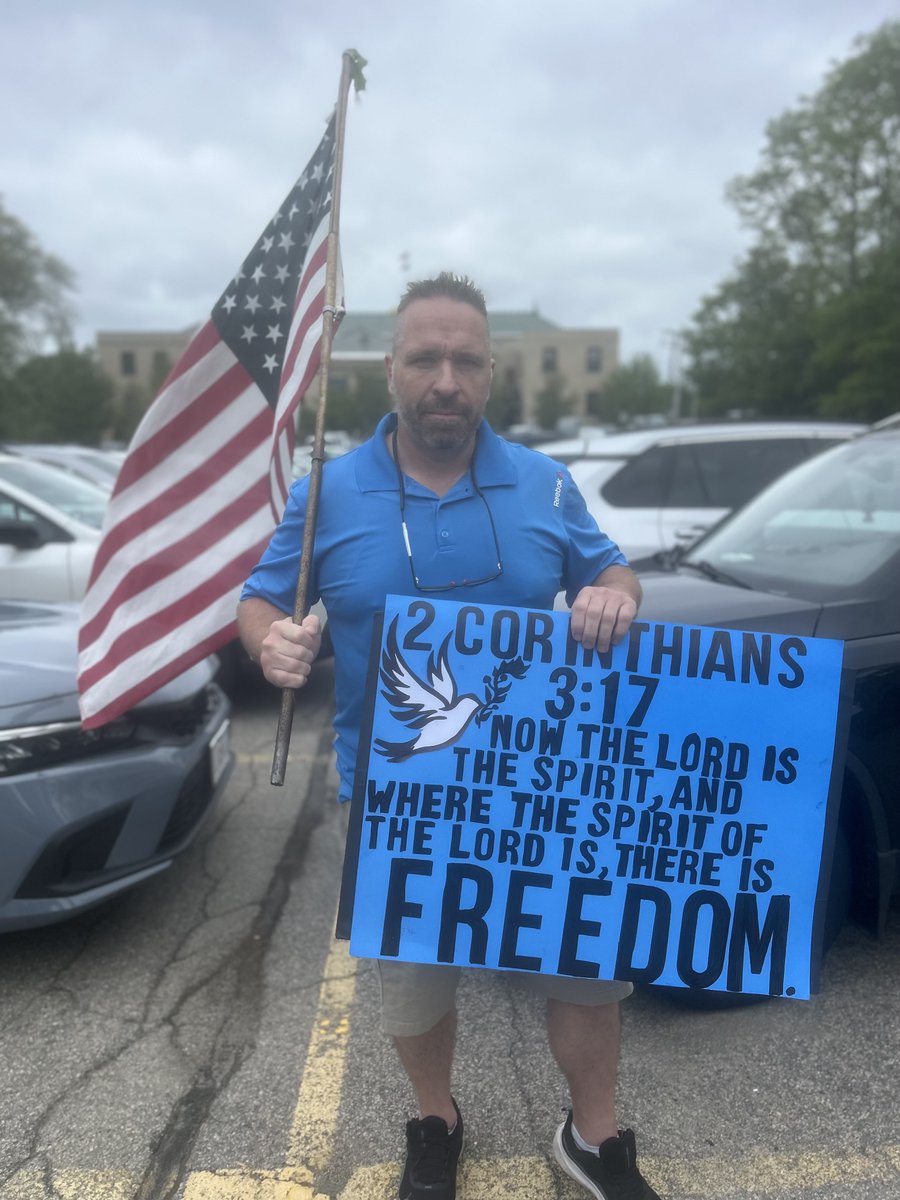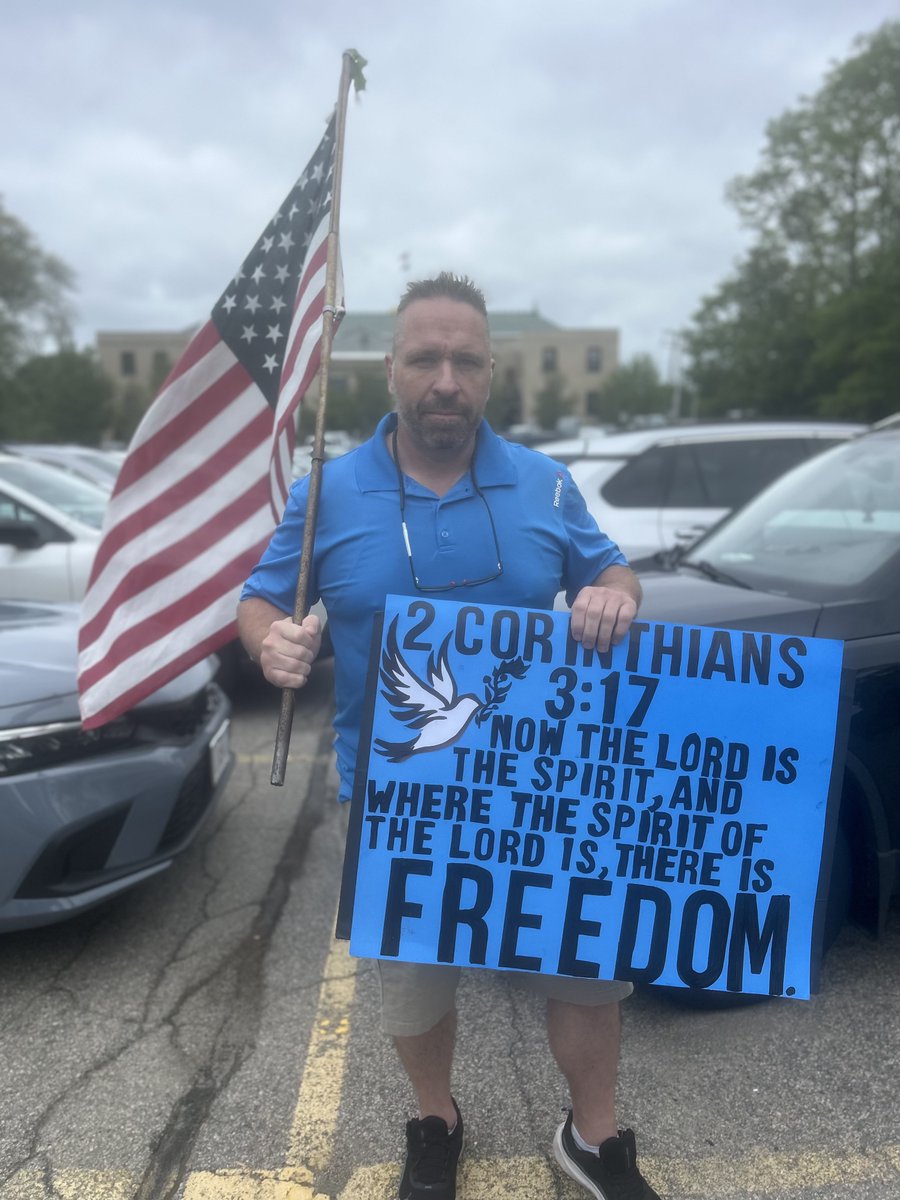This Is Jason Grant: Flag, Scripture, and Unconstitutional Policing!
Overview of Unconstitutional Policing: A Case Study
In May 2025, a significant incident highlighting issues of unconstitutional policing occurred in Massachusetts. Jason Grant, a local citizen, was standing silently with a flag and a sign quoting Scripture when he was approached by the Massachusetts state police. Despite a court ruling that supported his right to peacefully express his beliefs, he was told he could not engage in this form of protest. This situation raises critical questions about the boundaries of free speech and the role of law enforcement in protecting or infringing upon constitutional rights.
The Incident
The core of the incident revolves around Jason Grant’s exercise of his First Amendment rights. Holding a flag and a sign with a Scripture quote, he was peacefully demonstrating his beliefs. This act of silent protest is a fundamental expression of free speech, which is protected by the Constitution. However, the actions of the Massachusetts State Police, who intervened and directed Grant to cease his activity, suggest a troubling trend in policing practices that undermine these rights.
The tweet from the Center for American Liberty emphasizes the contradiction between Grant’s constitutional rights and the police’s response. The implication of unconstitutional policing is clear: law enforcement officials may sometimes overstep their authority, infringing upon the rights of citizens in the process. This raises alarms about the state of civil liberties and the necessity for accountability in policing.
Understanding Unconstitutional Policing
Unconstitutional policing refers to actions taken by law enforcement that violate individuals’ constitutional rights. These violations can manifest in various forms, from unlawful searches and seizures to restrictions on free speech and assembly. The incident involving Jason Grant serves as a poignant reminder that even in a democratic society, individuals may face suppression when expressing their views.
- YOU MAY ALSO LIKE TO WATCH THIS TRENDING STORY ON YOUTUBE. Waverly Hills Hospital's Horror Story: The Most Haunted Room 502
The importance of understanding unconstitutional policing lies in its implications for democracy and civil rights. Citizens must remain vigilant about their rights and the actions of law enforcement agencies. When these rights are threatened, it is crucial to advocate for accountability and transparency in policing.
The Role of the Courts
The reference to a previous court ruling in favor of Grant’s right to protest highlights the essential role that the judicial system plays in safeguarding civil liberties. Courts serve as a check on governmental power, ensuring that laws and practices align with constitutional principles. When a court affirms an individual’s right to free speech, it establishes a legal precedent that should guide the actions of law enforcement.
However, the enforcement of these rulings can sometimes falter. The incident involving Grant suggests that even when legal protections are established, there can be a disconnect between judicial rulings and their implementation on the ground. This disjunction points to the need for ongoing legal education and training for law enforcement personnel to ensure they understand and respect constitutional rights.
The Importance of Free Speech
Free speech is a cornerstone of democracy, allowing individuals to express their views, challenge authority, and engage in public discourse. The First Amendment of the U.S. Constitution protects this right, recognizing that a healthy democracy depends on the ability to voice dissent and advocate for change.
In the digital age, the significance of free speech has only grown. Social media platforms, like Twitter, provide individuals with a platform to share their thoughts and organize movements. The viral nature of the tweet from the Center for American Liberty illustrates how social media can amplify voices and shed light on issues of public concern. The widespread dissemination of Grant’s story can serve as a catalyst for discussions about civil liberties and policing practices.
The Role of Advocacy Groups
Organizations such as the Center for American Liberty play a critical role in defending individual rights and raising awareness about constitutional violations. By highlighting incidents of unconstitutional policing, these groups work to hold law enforcement accountable and promote a culture of respect for civil liberties.
Advocacy groups often provide resources, legal support, and education to empower individuals. They can help citizens understand their rights and navigate the complexities of the legal system. In the case of Jason Grant, the involvement of such organizations lends support to his cause and underscores the broader implications of his experience.
The Broader Context
The incident with Jason Grant is not isolated; it reflects broader societal issues regarding policing and civil rights. Across the United States, there have been numerous instances of police overreach, leading to public outcry and calls for reform. The conversation surrounding policing practices is evolving, with many advocating for changes that prioritize community engagement and respect for individual rights.
As discussions about policing and civil liberties continue, it is essential to foster an environment where citizens can express their beliefs without fear of retribution. The incident serves as a reminder that vigilance is necessary to protect the freedoms that are foundational to American democracy.
Conclusion
The situation involving Jason Grant and the Massachusetts State Police underscores the ongoing challenges related to unconstitutional policing and the protection of civil liberties. It highlights the critical importance of free speech, the role of the courts in safeguarding rights, and the need for accountability within law enforcement. As citizens navigate the complexities of expressing their beliefs, advocacy groups and legal protections remain vital in ensuring that the principles of democracy are upheld.
By remaining informed and engaged, individuals can contribute to a culture that values and protects constitutional rights. The incident serves as a rallying point for discussions about the importance of free speech and the need for reform in policing practices, ultimately advocating for a society where all individuals can express their beliefs freely and peacefully.

This is Jason Grant, standing silently with a flag and a sign quoting Scripture. Massachusetts State Police told him he can’t even do that—despite a court ruling saying otherwise.
This is what unconstitutional policing looks like. #KarenReadTrial2 @marcorandazza @mark_trammell… pic.twitter.com/apUnzKiRZV
— Center for American Liberty (@Liberty_Ctr) May 16, 2025
This is Jason Grant, standing silently with a flag and a sign quoting Scripture
In a moment that has sparked significant debate around free speech and police conduct, Jason Grant stood resolutely with a flag and a sign that quoted Scripture. This peaceful demonstration, however, was met with disapproval from the Massachusetts State Police, who told Grant he couldn’t even express himself in this manner—despite a court ruling affirming his right to do so. Such incidents raise concerns about the limits of free speech and how law enforcement interprets and enforces these limits.
Massachusetts State Police told him he can’t even do that—despite a court ruling saying otherwise
When we think about our rights, it’s pivotal to remember that the First Amendment protects our freedoms, including the right to express our beliefs publicly. In Jason Grant’s case, the actions of the Massachusetts State Police seem to contradict this foundational principle. After a court ruling that supported his right to hold a sign and express his views, the police’s intervention raises serious questions about their understanding of constitutional rights. It’s a reminder that even when the law is on your side, the reality can be quite different.
This is what unconstitutional policing looks like
Unconstitutional policing is a term that describes actions taken by law enforcement that violate the rights guaranteed by the Constitution. In Grant’s case, it appears that the police officers chose to ignore the legal precedence set by the court ruling. This can lead to a chilling effect on public expression, dissuading individuals from voicing their opinions for fear of retribution. When citizens like Grant face pushback from law enforcement for merely exercising their rights, it sends a troubling message about the state of civil liberties in our country.
#KarenReadTrial2
The situation surrounding Jason Grant intersects with broader discussions, including the ongoing #KarenReadTrial2 debate, which has garnered significant attention. This trial has implications for how laws are interpreted and enforced, particularly regarding the rights of individuals to express dissenting opinions. It is crucial to keep a close eye on these developments, as they could affect the landscape of public protest and free speech rights across the nation.
@marcorandazza
Prominent figures in the legal community, such as @marcorandazza, have been vocal about cases like Grant’s and the broader implications of police actions that seem to infringe upon individual rights. These discussions are vital as they help illuminate the challenges faced by citizens when they attempt to exercise their rights in public spaces. Legal experts often emphasize the importance of holding law enforcement accountable to ensure that constitutional protections are not eroded.
@mark_trammell
Similarly, voices like @mark_trammell contribute to the dialogue surrounding these issues. Their insights often highlight the delicate balance between maintaining public order and upholding citizens’ rights. As citizens, it is essential to educate ourselves about our rights and the laws that protect us, especially in light of incidents that suggest a disconnect between legal rulings and police actions.
The Importance of Free Speech
Free speech is a cornerstone of democracy, allowing individuals to express their beliefs, challenge authority, and advocate for change. When incidents like Jason Grant’s arise, they remind us of the ongoing struggle to maintain this right. It’s not just about one person holding a sign; it’s about ensuring that everyone has the right to voice their opinions without fear of repression. This is especially relevant in today’s political climate, where protests and public demonstrations are commonplace.
Understanding Your Rights
Many people may not fully understand their rights when it comes to public demonstrations. Knowing that you have the right to express your beliefs is critical, but it’s equally important to understand the legal framework that protects these rights. Resources like the ACLU’s guide on protesters’ rights provide valuable information on what you can and cannot do during a public demonstration. Educating oneself is the first step toward empowerment and ensuring that your voice is heard.
The Role of Law Enforcement
Law enforcement is tasked with maintaining public order, but this must be balanced with respecting citizens’ rights. When police officers intervene in peaceful protests or demonstrations, it can lead to a breakdown of trust between the community and law enforcement. Training programs that emphasize constitutional rights and de-escalation tactics can help officers better understand their role in a democratic society. It’s essential for police departments to foster relationships with the communities they serve, ensuring that they are allies rather than adversaries.
Conclusion: The Ongoing Fight for Rights
Jason Grant’s experience serves as a potent reminder of the ongoing struggles for civil liberties in America. It’s essential for individuals to remain vigilant and informed about their rights. As citizens, we must also hold law enforcement accountable when actions seem to violate the principles of free speech. Engaging in discussions, staying informed, and advocating for your rights are crucial steps in protecting the freedoms we cherish.
In light of incidents like this, let’s continue to advocate for a society where everyone can express their beliefs without fear of reprisal. We must work together to ensure that our rights are upheld and that our voices are not silenced.

